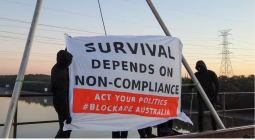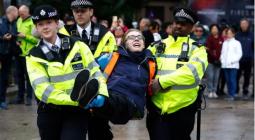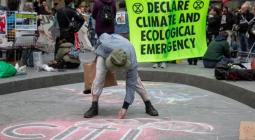UN human rights expert raises concerns about US charges against climate protesters
Mary Lawlor criticizes US’s failure to respond to concerns after Alex Connon and John Mark Rozendaal charges
A leading UN human rights expert has expressed dismay after the US government failed to respond to questions about the criminal crackdown on peaceful climate protesters.
Mary Lawlor, the UN special rapporteur on human rights defenders, on Tuesday published a letter sent to US authorities raising concerns about the potential violation of international human rights law after two climate activists, Alex Connon and John Mark Rozendaal, were charged with crimes that carried lengthy jail terms.
Connon, director of the Stop the Money Pipeline coalition, and Rozendaal, a professional cellist, were among hundreds of climate activists arrested outside Citibank’s headquarters in New York City over the summer, during a series of non-violent protests calling for an end to financing the fossil fuel industry.
On Twitter/X, Lawlor wrote that she was “very disappointed” to have not received a response from US authorities to the letter sent on 30 September.
The letter was signed by four UN human rights experts – Lawlor, and the special rapporteurs on the right to a healthy and sustainable environment, climate change, and the right to protest. It is customary to give states 60 days to respond privately before communications are shared publicly.
In the letter, which was sent to the US diplomatic mission at the United Nations in Geneva, the UN experts raised concerns about the factual basis of an assault charge against Rozendaal and Connon, resulting from a complaint by a member of Citibank’s security staff.
After participating in another peaceful protest, the two activists were also charged with criminal contempt, which carries a seven-year maximum sentence.
The assault charges were dropped after the security guard failed to submit a deposition. The contempt charges were resolved by the pair pleading guilty to “disorderly conduct” – referring to Rozendaal playing the cello in a public plaza outside Citibank HQ and Connon sheltering him from the rain with an umbrella.
The letter said that they feared the contempt charge was “without foundation” and appeared to be a punishment for participating in peaceful protests on the climate crisis and human rights.
“Please indicate what steps have been taken and measures put in place to ensure that all human rights defenders taking peaceful action to promote measures to mitigate climate change and a just transition can carry out their work free from fear of threat, violence, harassment or retaliation of any sort,” the UN experts wrote.
In a statement, a state department spokesperson said: “The US supports the mandate of the SR on human rights defenders, and we endeavor to respond to inquiries by special procedures mandate holders as promptly as possible.”
Amid continuing fossil fuel expansion, activists in the US and around the world have turned to protests and non-violent civil disobedience such as blocking roads and chaining themselves to trees and equipment as a way to slow down construction, raise public awareness and press for more urgent climate action by governments, corporations and financiers.
“They are all being met with criminalisation, as in this [Connon and Rozendaal] case,” said Lawlor.
The crackdown against activists has intensified amid increasing death and destruction from extreme heat, floods, drought and sea level rise, with mounting evidence of collusion between corporate lobbyists, lawmakers and state security forces.
Lawlor added: “Authorities should be listening to defenders, but they are not. The climate crisis is a human rights crisis, but states aren’t responding as they should. They need to change course and start really listening otherwise they are going to lock us into a future where the rights of huge numbers of people around the world will be at risk.”
Also on Tuesday, the environmental activist and educator Rachel Berkrot was spared jail after last-minute plea deal in which the critical infrastructure charge was dropped by prosecutors. Berkot was among eight climate activists charged under West Virginia’s controversial critical infrastructure law, after participating in non-violent protests against the Mountain Valley fossil gas pipeline. Dozens more have been charged and face civil lawsuits.
“This escalation in repression is part of a long legacy of collusion between the state and the fossil fuel industry to silence resistance,” said Berkrot, who received a $500 fine after pleading no contest to trespass and obstruction charges.
At least 22 states have passed anti-protest laws known as critical infrastructure laws punishing civil disobedience with felonies, fines and long jail sentences since the 2016 Indigenous-led non-violent uprising against the Dakota Access oil pipeline on the Standing Rock Indigenous reservation.
Cover photo: John Mark Rozendaal is r playing a cello in front of Citibank headquarters in New York, on 8 August 2024.






